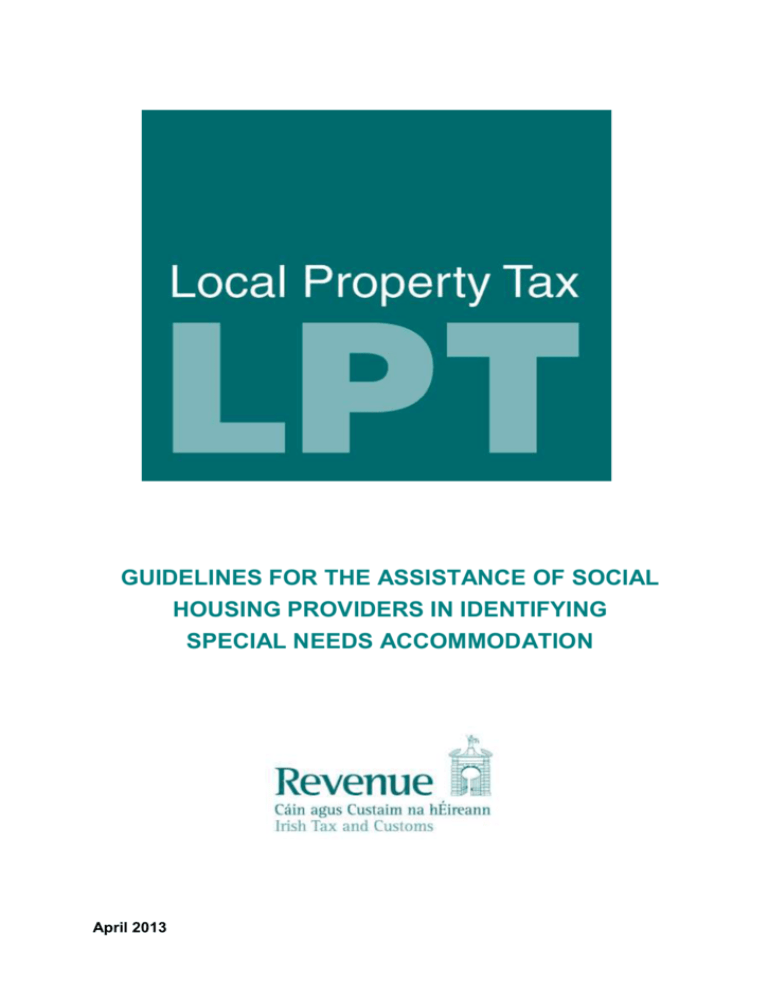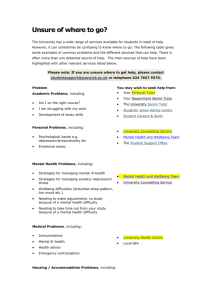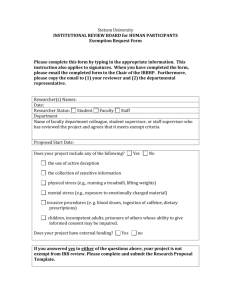Guidelines on Special Needs Accommodation
advertisement

GUIDELINES FOR THE ASSISTANCE OF SOCIAL HOUSING PROVIDERS IN IDENTIFYING SPECIAL NEEDS ACCOMMODATION April 2013 Table of Contents 1. Local Property Tax Exemption for Special Needs Accommodation ..... 3 2. General Needs versus Special Needs Accommodation ........................ 3 3. What are Special Needs? .......................................................................... 4 3.1 Types of Special Need ................................................................. 4 4. Provision of Services/Support ................................................................. 5 5. Capital Assistance Scheme ...................................................................... 6 6. Application for, and Duration of, Exemption .......................................... 6 2 1. Local Property Tax Exemption for Special Needs Accommodation A residential property that is owned by a charity or a public body (referred to generically in these guidelines as ‘social housing bodies’1) and that is used solely or primarily to provide special needs accommodation is exempt from the charge to Local Property Tax (LPT). For the purpose of this exemption, special needs accommodation is accommodation that is provided to persons who require special accommodation and support to enable them to live in the community. While the relevant legislation specifically references old age and physical and mental disability, these particular categories of need are not exhaustive and other categories may also be included, for example, victims of domestic abuse and the homeless. 2. General Needs versus Special Needs Accommodation The exemption from the charge to LPT does not extend to residential properties that are used for general needs accommodation. The term general needs accommodation refers to housing units that are provided for people who have no particular need other than a housing need. These would be people who, before they were housed by a social housing body, would have been living in inadequate or unsuitable housing and who would not have had the resources to provide their own housing. In contrast, special needs accommodation means housing provided for people who have a particular or special need in addition to a general housing need. 1 These are essentially local authorities and bodies that are approved for the purposes of section 6 of the Housing (Miscellaneous Provisions) Act 1992. 3 3. What are Special Needs? In determining whether any or all of the accommodation which a social housing body provides is special needs accommodation, the question to be asked is whether the body provides, in addition to housing, services and/or support that are aimed at the needs of the people who are housed by it and who, without such services and/or support would be unable to live independently in the community. 3.1 Types of Special Need The following list, which is not exhaustive, is intended to indicate the types of special need that are covered by this guidance: old age physical, mental, sensory or intellectual disability alcohol dependency drug dependency domestic violence or abuse *homelessness *A homeless person in a special needs context is a person who, prior to moving into the ‘special needs’ housing unit, was accommodated in temporary/emergency homeless accommodation and who would be unable to sustain a tenancy without the support provided by, or on behalf of, a social housing provider. 4 4. Provision of Services/Support The relevant legislation does not specify the period for which services and/or support should be provided to avail of the LPT exemption: it may be short-term or long-term. Nor does the relevant legislation specify the nature and level of the services and/or support to be provided: this may be high level and frequent or low level and intermittent. Revenue recognises that it would not be practical for the legislation to cater for such variations and it does not intend to attempt do so in these guidelines. There is a continuum of services/support associated with special needs accommodation and the approach adopted by a social housing provider will be dictated by the particular circumstances and the particular special need being met. Indeed, the particular circumstances may dictate that the services/support are not provided by the social housing provider itself. It is acceptable for a social housing provider to arrange for one or more third party specialist providers to provide the necessary services/support. However, the social housing provider must have the lead role in, and be actively involved in, putting any such arrangement in place. The following is intended as broad guidance only. Revenue would not expect that all of the services/supports mentioned would necessarily feature in the case of each property being provided. The provision of services/support by on-site staff, such as a caretaker/warden. The provision of services/support by visiting staff (or third parties on behalf of the social housing provider), such as tenancy support, health/medical care or counselling services. The provision of social support on an informal or voluntary basis by specialist (care) groups. Assistance with meals, laundry, housework, shopping, personal care and transportation. The provision of communal facilities. The provision of built-in supports through design, location, layout of housing, alarm and security systems to facilitate independent living. 5 5. Capital Assistance Scheme Revenue understands from the Department of the Environment, Community and Local Government that the Capital Assistance Scheme (CAS) is used almost exclusively to fund the provision of special needs accommodation by social housing providers. It is, therefore, prepared to accept that any property that has been funded under this scheme and that is specifically approved for special needs accommodation by the relevant local authority will be exempt from the charge to LPT. This is subject, of course, to the particular property continuing to be used as special needs accommodation. Properties may, of course, have been funded under other local authority schemes such as the Capital Loan and Subsidy Scheme and the Capital Advanced Leasing Facility. However, unlike the CAS, these schemes are not used almost exclusively to fund special needs accommodation. It is, therefore, not possible for Revenue to adopt the same broad approach as with the CAS. Properties funded under these other schemes can, of course, qualify for exemption, but this can only be because of the use to which they are put and not solely because of the source of their funding. This approach will be subject to review by Revenue in the light of future changes in the funding arrangements for social housing providers. 6. Application for, and Duration of, Exemption A social housing provider is not required to apply for an exemption in respect of a particular property. Instead, the exemption claim is made on a self-assessment basis. Where the particular social housing provider submits individual LPT1 Return forms for any properties it owns, exemption type ‘F' should be inserted in the exemption box on the form.2 For those social housing providers who submit the consolidated Return form (LPT 3) through the process agreed with Revenue, each exempt property should be identified on the accompanying spreadsheet of properties 2The exemption types are listed on page 10 of the Revenue booklet that was issued with the LPT1 Return form. 6 as the means of claiming the exemption on a self-assessment basis. A copy of the agreed consolidated LPT Return form (LPT 3) will be available from the Revenue website shortly. As is the case with all self-assessed taxes, the property owner must retain evidence to support the claim for exemption on the grounds of special needs accommodation. Evidence, in this context, includes a description of the type of special needs accommodation and documentary details of the support services that are provided to the occupants of the accommodation. The usual LPT ‘rule’ is that a property that is exempt on the first liability date of a 3year valuation period is exempt until the first liability date of the following 3-year valuation period. This means that a property that is exempt on 1 May 2013 will continue to be exempt until 1 November 2016, the valuation date for 2017, even if it ceases to be used for special needs accommodation at any stage after 1 May 2013. A fresh claim for exemption will have to be made for the year 2017 et seq. Finally, the exemption will have to be claimed on any properties acquired by a social housing body in the period between 2 May 2013 and 1 November 2015 to ensure that the property will be exempt for any of the years 2014, 2015 and 2016. 7 Contact Details: Further information relating to LPT is available as follows: Web: www.revenue.ie Email: lpt@revenue.ie Aertel: Page 593 By Post: LPT Branch, P.O. Box 1, Limerick Phone: 1890 200 255 (ROI only); +353 1 7023049 (from outside ROI) Information is also available from the Citizens Information Service: Web: www.citizensinformation.ie Phone: 0761 07 4000, Monday to Friday, 9am - 8pm In person: by calling to a Citizens Information Service near you. FAQ’s that are regularly updated are available on www.revenue.ie. 8





